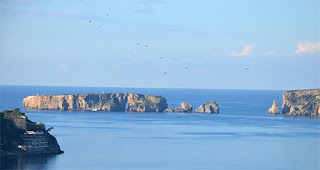 |
| Τσιχλί-Μπαμπά |
 |
| Ανάκτορο του Νέστορα |
 |
| Αγγλικό Μνημείο |
Σε αυτή την μικρή γωνία της Πελοποννήσου φαινόταν ότι κάθε εποχή της ευρωπαϊκής ιστορίας είχε αφήσει το δικό της αποτύπωμα. Η ομηρική μυθολογία, η αρχαία και μεσαιωνική ιστορία, οι θρυλικές μορφές από την εποχή των ευρωπαϊκών αυτοκρατοριών και της ελληνικής επανάστασης, τα φαντάσματα και τα βήματα του παρελθόντος - όλ’ αυτά είχαν μαζευτεί σε αυτό το συμπυκνωμένο περιβάλλον, σ’ αυτό το τοπίο εκθαμβωτικής φυσικής εμορφιάς.
Οι πρώτες εντυπώσεις είναι καθοριστικές. Οι πρώτες μου εντυπώσεις της Ελλάδας άλλαξαν την πορεία της ζωής μου. Σε αυτό δεν είμαι μοναδικός. Ερωτεύτηκε και ο Λόρδος Βύρωνας - πράγμα κάπως πιο σημαντικό για την πορεία της ελληνικής ιστορίας! - κατά την διάρκεια της πρώτης του εκδρομής στην Ελλάδα το 1809. Πραγματικά ερωτεύτηκε πολλαπλά· ερωτεύτηκε, με τρόπο που έμεινε γνωστός παντού, την Τερέζα Μακρή, την «Κόρη των Αθηνών», αλλά ερωτεύτηκε - ακόμα πιο επίμονα - και την Ελλάδα την ίδια: τα τοπία της, το μυθικό της παρελθόν, τον λαό της και τα έθιμά του. Και προ παντός ερωτεύτηκε την ιδέα της Ελλάδας: μιας Ελλάδας της ριζοσπαστικής ελευθερίας, απελευθερωμένης από τις οθωμανικές χειροπέδες. Σαγηνεύτηκε από την Ελλάδα (παρέθεσα παρακάτω μια αγαπημένη μου στροφή από Το προσκύνημα του Τσιλντ Αρόλδου), αλλά φαίνεται ότι για ένα μεγάλο χρονικό διάστημα δεν πίστευε πως οι Έλληνες θα εξεγείρονταν πραγματικά για να απαιτήσουν την ελευθερία τους. Ήταν ο φίλος του, ο ποιητής Πέρσι Σέλλεϋ, που τον δίδαξε φιλελληνικό πολιτικό ακτιβισμό ενός πιο δυναμικού είδους. Η ριζοσπαστικότητα και ο ιδεαλισμός του Σέλλεϋ ξεσήκωσε τον Βύρωνα και τον ενέπνευσε στην τελευταία του μεγάλη πρωτοβουλία, το 1823: την περιπέτεια που κατέληξε στον θάνατο του Βύρωνα στο Μεσολόγγι στις 19 Απρίλη του 1824 και στην απελευθέρωση ενός μεγάλου κύματος φιλελληνικού συναισθήματος παντού στην Ευρώπη και στις Ηνωμένες Πολιτείες.
 |
| Ο θάνατος του Βύρωνα, Μεσολόγγι |
Ο Βύρωνας ήταν φιλελεύθερος και η συνεισφορά του στον ελληνικό αγώνα βασίστηκε στα φιλελεύθερα ιδανικά. Αλλά επί της ουσίας ο Φιλελληνισμός δεν είναι μια πολιτική ιδεολογία, αν και έχει, βέβαια, μια πολιτική διάσταση. Η ιστορία των βρετανικών επαφών με την Ελλάδα αυτούς τους δυο αιώνες που πέρασαν δείχνει ότι ο κατάλογος των παθιασμένων Βρετανών Φιλελλήνων περιλαμβάνει φιλελεύθερους, συντηρητικούς, σοσιαλιστές και τους απολύτως απολιτικούς. Κι επιπλέον θα ήταν λάθος κανείς να φανταστεί ότι ο Φιλελληνισμός, αν και έχει ιστορικές συνδέσεις και βαθιές ιστορικές ρίζες, ανήκει αποκλειστικά στο παρελθόν. Πιστεύω πάντως ότι ο νεαρός Βύρωνας μάς δείχνει από τί αποτελείται ο Φιλελληνισμός. Απλώς, πρόκειται για μια ερωτική σχέση που μεταμορφώνει. Τα εκατομμύρια των συμπατριωτών μου που πηγαίνουν κάθε χρόνο στην Ελλάδα είναι εξίσου ευάλωτα στη γοητεία της Ελλάδας όσο και ο Βύρωνας το 1809. Το εάν η πρώτη αυτή σπίθα της αγάπης θα εξελιχτεί σε κάτι πιο σταθερό και σημαντικό ή όχι, εξαρτάται από πολλούς παράγοντες, συμπεριλαμβανομένης της προσωπικής επένδυσης του χρόνου, της προθυμίας να μάθει κανείς την γλώσσα, να αποκτήσει μια γνώση και ένα μερίδιο του πολιτισμού. Για όσους ερχόμαστε στην Ελλάδα και την ερωτευόμαστε πραγματικά, η ερωτική σχέση αυτή διαμορφώνει τη ζωή μας: οδηγεί το παρόν μας και επηρεάζει το μέλλον μας, και γίνεται κι γρήγορα ένα αγαπημένο, αναγκαίο μέρος του προσωπικού μας παρελθόντος.
Ζήτω η Ελλάς! Ζήτω η λευτεριά των Ελλήνων!
Τζων
Εορτή του Ευαγγελισμού της Θεοτόκου, 2021
 |
| Φραγκικό κάστρο, Παλιό Ναυαρίνο |
Where’er we tread ‘tis haunted, holy ground;
No earth of thine is lost in vulgar mould,
But one vast realm of wonder spreads around,
And all the Muse’s tales seem truly old,
Till the sense aches with gazing to behold
The scenes our earliest dreams have dwelt upon:
Each hill and dale, each deepening glen and wold
Defies the power which crush’d thy temples gone:
Age shakes Athena’s tower, but spares gray Marathon.
Προσκύνημα τοῦ Τσὶλνδ Ἁρόλδου, μέρος ΙΙ.88
Εἰς οἱονδήποτε μέρος καὶ ἂν διευθύνωμεν τὰ βήματά μας, πατοῦμεν γῆν ἱερᾶν·
οὐδὲν μέρος τοῦ ἐδάφους σου καθιερώθη εἰς χυδαῖα μνημεῖα,
ἀλλ᾽ὅλη ἡ χώρα σου εἶναι εὐρὺ θέατρον θαυμάτων·
ὅλα τὰ πλάσματα τῆς μούσης φαίνονται ὡς τόσαι ἀλήθειαι,
οἱ δὲ ὀφθαλμοί μας ἀποκάμνουσι θαυμάζοντες
τοὺς τόπους τούτους εἰς τοὺς ὁποίους μετεφερόμεθα τόσον συχνάκις
ὑπὸ τῶν ὀνείρων τῆς νεανικῆς ἡλικίας μας·
τὰ ὄρη καὶ αἱ κοιλάδες σου, οἱ λόφοι καὶ αἱ πεδιάδες σου,
ἀνθίστανται εἰς τὴν καταστρεπτικὴν δύναμιν τοῦ χρόνου,
ὁ ὁποῖος κατηρείπωσε τοὺς ναούς σου.
Οἱ αἰῶνες ἐκλόνησαν τὰς μεγαλοπρεπεῖς οἰκοδομὰς τῶν Ἀθηνῶν,
ἀλλ᾽ἐσεβάσθησαν τὸ πεδίον τοῦ Μαραθῶνος.














